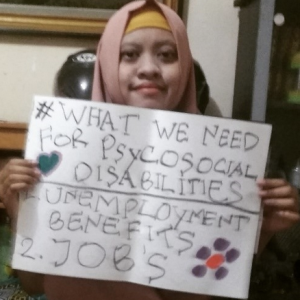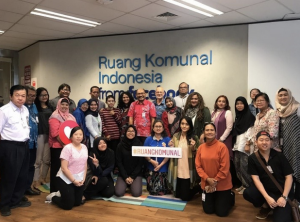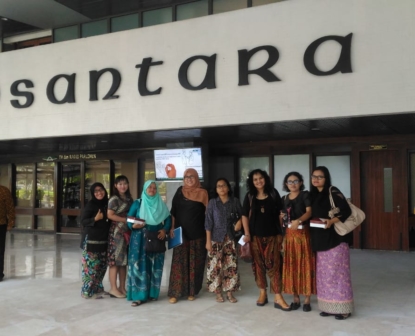Project
Becoming Disability Rights Defenders
-
Amount Funded
25,000 EUROProject Duration
01 Mar 2019 - 01 Mar 2020 -
-
Lead organisation
Indonesian Mental Health Association (IMHA)
-
Indonesian Mental Health Association (IMHA) is an organisation that focuses on the promotion of the rights of persons with mental health and psychosocial disabilities. IMHA foresees a future in which all rights and full freedom of persons with mental and psychosocial disabilities are realised. They advocate the practice of inclusion and its manifestation in all national policies and laws in Indonesia.
-
Organisation
Indonesian Mental Health Association (IMHA) is an organisation that focuses on the promotion of the rights of persons with mental health and psychosocial disabilities. IMHA foresees a future in which all rights and full freedom of persons with mental and psychosocial disabilities are realised. They advocate the practice of inclusion and its manifestation in all national policies and laws in Indonesia.
-
Project
Becoming Disability Rights Defenders project ensures that women with psychosocial disability are activists who are willing and able to stand up for themselves and for other women, particularly for those who suffer similar situations. This is through intensive trainings, direct involvement in advocacy, lobbying, and campaign activities, and building relationships with other disablity movements and Civil Society Organisations (CSOs), the project develops the women’s capacity to be advocates and rights defenders, build their self-awareness on discrimination and violence they face, provide knowledge, skills, and experience in pushing for disabled person’s rights, develop leadership, and connect them both with cross-disability movements and mainstream women’s movements. As these transpire, the project ensures the direct involvement of the women from planning to campaigning and lobbying.
-
-
Becoming Disability Rights Defenders project ensures that women with psychosocial disability are activists who are willing and able to stand up for themselves and for other women, particularly for those who suffer similar situations. This is through intensive trainings, direct involvement in advocacy, lobbying, and campaign activities, and building relationships with other disablity movements and Civil Society Organisations (CSOs), the project develops the women’s capacity to be advocates and rights defenders, build their self-awareness on discrimination and violence they face, provide knowledge, skills, and experience in pushing for disabled person’s rights, develop leadership, and connect them both with cross-disability movements and mainstream women’s movements. As these transpire, the project ensures the direct involvement of the women from planning to campaigning and lobbying.
-
People with psychosocial disabilities (PWPD) in Indonesia are often indefinitely shackled, chained, and detained by their families or in social care institutions in violation of most fundamental rights and laws. In these dungeons, basic rights and services are severely lacking. Thousands of persons with psychosocial disabilities are imprisoned in facilities that resemble prisons. Once a person is committed into one of these institutions, he or she loses the ability to make even the most basic everyday decisions — without any legal process.
The situation is so bad that Human Rights Watch undertook an investigation and published their findings under the title “Living in Hell”. Women with psychosocial disabilities suffered on two levels: as disabled people and as women. In psychiatric hospitals, traditional healer facilities, and social care institutions, many of them face sexual harassment and assault. Since there is no legal protection or government oversight in social care institutions, their futures lie entirely in the hands of the institution’s employees, the majority of whom are men. Many women with psychosocial disabilities have been bathed by male workers, often in public places. Male employees are likewise free to enter their living quarters at any time of day or night. Toilets and restrooms are frequently not just filthy, but also lacking in basic amenities.
People with severe mental illnesses (schizophrenia, schizoaffective disorder, and bipolar disorder) who originate from simple families with varying educational backgrounds and skill levels are entitled to participate in this program. Ignorance, stigma, violence, and long-term discrimination against people with psychosocial disabilities render them vulnerable, lacking in self-confidence and believing they lack self-esteem, degrees, and abilities comparable to others.
The Indonesian Mental Health Association (IMHA) is a non-profit organization dedicated to advocating for, monitoring, and enforcing all human rights for people with mental illnesses and psychosocial disabilities. IMHA envisions a future in which people with psychosocial disabilities have full access to all human rights and freedoms. It supports the concept of inclusion and would like to see it reflected in all of Indonesia’s national policies and legislation.
IMHA implemented a highly groundbreaking project, Becoming Disability Rights Defenders: Capacity Building for Women with Psychosocial Disability. The goal of the project was to develop women activists with psychosocial disabilities who are willing and able to speak up for themselves and other women, especially those in similar situations. It aimed to achieve this by developing a network of women activists and organizations, as well as legal aid and other human rights organizations; developing human rights advocates among women with psychosocial disabilities, and, building the capacity of women with psychosocial disabilities to become disability and women’s right defenders, and finally developing a network and building allies with women activists and organizations.
Many people do not consider women with psychosocial disabilities to be equals, let alone capable of being human rights defenders. This initiative therefore, also aimed at raising awareness and developing alliances with women’s organizations, legal aid organizations, and human rights advocates. There are currently few activists outside of the disability movement who are aware of, much less comprehend, the condition of PWPD. Without the cooperation of other key actors in the civil society movement, the fight for inclusion and equality would be extremely difficult.
“We’re particularly amazed that the participants were able to comprehend CRPD based on their personal experiences as people with mental illnesses and apply it to reading and responding to everyday events as well as societal challenges and scenarios. They can also use this knowledge to criticize government policy.” – Yeni Rosa Damayanti, Director IMHA
We would like to express our gratitude to Voice that give incomparable support for our effort to “give back the voice” to women and men with psychosocial disabilities, one of the most stigmatized and discriminated group in our society. We gained a lot of learning while also harvesting the results of this project. We now have new cadres and new networks that will contribute greatly to our advocacy effort in the future for the right of persons with psychosocial disability. – Participant
The success in boosting participants’ self-esteem and raising understanding of their rights as human beings, citizens, and people with disabilities is the project’s most significant achievement. Participants who previously lacked self-confidence and were ashamed of their disability status, as well as receiving stigma and derision from the surroundings, were able to acknowledge their rights as persons with mental disabilities. Participants also formulated a number of campaign and advocacy issues, as well as a creative design for a disability rights campaign based on the challenges they confront on a daily basis.

IMHA’s partner organizations greatly supported it in carrying out various advocacy activities for persons with mental disabilities, such as their involvement in the preparation of the RPP for Justice, writing shadow reports to the UN CRPD committee, and participation in a training on the UN CRPD.
The series of training sessions they attended as part of this project taught them that they have the same rights as everyone else, that many of their rights have been infringed, and that they have been treated unfairly. They would now know that they have the same rights as others and that the state is obligated to uphold these rights as a result of this instruction. The training curriculum taught the children about their essential rights as human beings, citizens, and people with disabilities, as well as equipped them with the necessary skills to advocate for themselves and for others.
As a result of the advocacy training, the participants felt confident in issuing a statement to condemn the media’s coverage of the COVID-19 pandemic, which is insensitive to persons with psychosocial disabilities.
The COVID-19 pandemic produced by the SARS-CoV-2 virus elicited a wide range of reactions from the general public. Since the first case in Indonesia was announced in early March 2019, social media was flooded with COVID-19 related content. Influencers and content creators competed to develop narratives that express their attention and ideas. Not to mention “witty” content, analysis, and narrative, all of which can be used to entertain the audience. Unfortunately, some of the information was developed by ignoring facts, ethics, a sense of care, and social solidarity, all of which are critical in dealing with the current pandemic. One of these contents, as seen in this image, depicts a homeless guy who has been tagged as ‘Crazy’ by the content producer. The author’s evaluation of the subject’s mental health status in the photo may be the basis for the label, which may not include the image’s source, photographer, location, or other information.
At first glance, the content has a positive tone because it tries to provide an argument that: “Crazy people rarely get sick because their lives are always happy and never care about the things around them. This is what makes his body so much healthier than the average sane person.” That’s the excerpt of the sentence in the caption for the Instagram account @pediayuks.
Of course, the haphazard argument presented by the account admin is not true because in reality those who are homeless on the street or those who are accommodated in government and private social institutions actually experience a high vulnerability to infectious diseases. A number of observations and studies have shown that people with mental disabilities who live on the streets and in some social institutions are actually more susceptible to being exposed to physical disorders on their skin, digestion, and so on. This is mainly due to poor sanitation, inadequate nutritional intake, poor personal and environmental hygiene, shackles and a fairly high population density. This vulnerable condition is also due to the fact that so far they are relatively unreachable by health services due to negative stigma, discrimination and neglect. Therefore, the narrative that is trying to be built about ‘Crazy People who are immune to disease’ as stated in the Instagram account is completely baseless and misleading. When this response was made, the Association of Healthy Souls and several elements of the Indonesian People with Disabilities were actually encouraging the government to issue a protocol for protection for persons with disabilities in government and private social institutions in order to reduce the risk of COVID-19 transmission.
As far as IMHA observed, the content as listed above then provokes other misleading comments from the audience of followers (followers), which include ODGJ’s aloof behavior as a social distancing practice. Comments like that further show a misleading understanding of the condition of ODGJ because what they are experiencing is not a form of social distancing as recommended by the government to minimize the spread of COVID-19 but is actually a form of social exclusion. The two things are certainly very different in definition and practice. According to WHO, social exclusion is a multidimensional process driven by inequality of power relations in the political, economic and socio-cultural spheres. Social exclusion is also related to inequality in access to health resources which can result in inequality in the health condition of an individual or group. They are shunned, ostracized, and neglected. Thus, what is experienced by ODGJ is a situation that is detrimental to their health, not the other way around.
Related to the explanation above, the Indonesia Mental Health Association urges content creators, especially those who are public figures, not to make people with disabilities, including people with certain mental health conditions, objects of social media content with false and misleading narratives. Moreover, if the narrative is made not based on a sufficient understanding of the condition of ODGJ in Indonesia and only aims to make fun of. Creating viral content that ridicules vulnerable groups in the midst of a pandemic is really not a commendable act. This also hinders various advocacy efforts and public education about the rights of people with mental disabilities that have been carried out for years by various parties such as mental health activists, health practitioners, public advocates, academics, journalists and other parties that cannot be mentioned. one by one. In this case, the viral behavior of misguided thinking can be more dangerous than the virus that causes the pandemic itself.
The Indonesia Mental Health Association also hopes that various parties will use the COVID-19 pandemic moment as a means of reflection to improve our attitudes and care for others, especially those who have been neglected and unreachable by public health services. When this pandemic ends, IMHA hopes that people’s views and attitudes towards vulnerable groups will change for the better. The COVID-19 pandemic has taught everyone that solidarity, social care, and empathy are indispensable in overcoming this crisis together. The organization also hopes to improve public health services that can reach more people, including people with mental disabilities who have been living on the streets or those who are accommodated in state and private social institutions.

https://www.youtube.com/channel/UCYzWJlBH3KM6RtdS5PwRdiQ/videos
-
News





